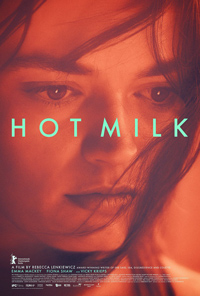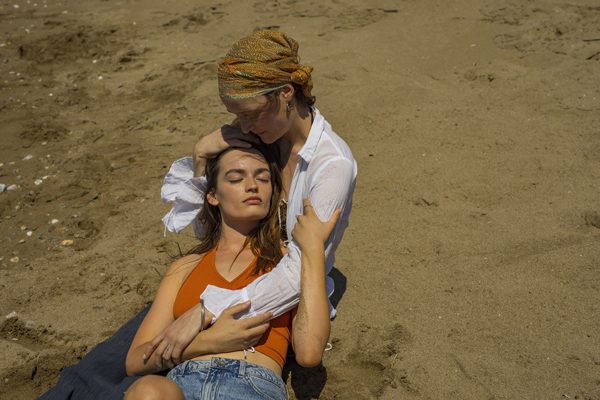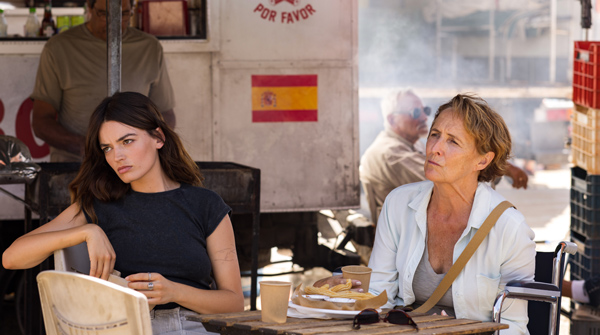The Eternal Daughter: Lenkiewicz Ladles the Milk of Sorrows
 Screenwriter Rebecca Lenkiewicz makes her directorial debut with Hot Milk, an adaptation of Deborah Levy’s comically menacing 2016 novel about a daughter tethered to a mysteriously ailing mother. Or, rather, it’s narrative about the point of un-tethering, fashioned a bit like the reverse situation of the Joseph Conrad novella The End of Tether (1902), wherein an aging sea captain lives solely for the happiness of his child. Having penned a number of high profile femme centered scripts, such as Disobedience (2017) for Sebastian Lelio and She Said (2022) for Maria Schrader, Lenkiewicz returns to a distilled, sinister sense of uneasiness which she mined so eloquently in Pawel Pawlikowski’s Ida (2013), where a relationship between women remains weighted down by a past they’ve been unable to articulate. The mammalian liquid of the title suggests the required sustenance supplied from a mother to her child—and it’s clearly something that’s been metaphorically denied or suspended.
Screenwriter Rebecca Lenkiewicz makes her directorial debut with Hot Milk, an adaptation of Deborah Levy’s comically menacing 2016 novel about a daughter tethered to a mysteriously ailing mother. Or, rather, it’s narrative about the point of un-tethering, fashioned a bit like the reverse situation of the Joseph Conrad novella The End of Tether (1902), wherein an aging sea captain lives solely for the happiness of his child. Having penned a number of high profile femme centered scripts, such as Disobedience (2017) for Sebastian Lelio and She Said (2022) for Maria Schrader, Lenkiewicz returns to a distilled, sinister sense of uneasiness which she mined so eloquently in Pawel Pawlikowski’s Ida (2013), where a relationship between women remains weighted down by a past they’ve been unable to articulate. The mammalian liquid of the title suggests the required sustenance supplied from a mother to her child—and it’s clearly something that’s been metaphorically denied or suspended.
Sofia (Emma Mackey) and her mother Rose (Fiona Shaw) arrive in the sweltering late summer heat of Almeria, a city in southwest Spain. Theirs is a desperate attempt to diagnose Rose’s illness, who insists she does not have the ability to walk, which has forced Sofia to become a parent to her mother since she was a young child. The unnamed disorder happened to strike around the time Sofia’s father Christos (Vangelis Mourikis) found religion and left them behind to pursue a new life in Athens (where he currently resides with a much younger wife and new infant child). Sofia’s own life has been put on hold and so she agreed to help Rose mortgage the house to pay for the expensive experimental treatment offered by Dr. Gomez (Vincent Perez). But it’s clear the finicky and fussy Rose might not want to be diagnosed, as being an invalid allows her to recuse herself from life. As the treatment progresses, Sofia begins a casual affair with another unmoored woman, Ingrid (Vicky Krieps), who like the medusa jellyfish plaguing the beach waters, awakens her impressionable new lover with sensations piercing through their mutual ennui.

While Lenkiewicz keeps the happenings of the novel intact, Sofia’s sardonic and cynical internal narration becomes absorbed in Emma Mackey’s performance, which gives the film version a more inherently contemplative vibe and enhances the ominous energies. The trip to Almeria for an exotic treatment facility to seek a questionable medical condition feels like pure Tennessee Williams territory, such as the fateful Cabeza de Lobo sequence in Suddenly, Last Summer. But the novel’s hyper articulation is clearly toned down, specifically some of Levy’s more kooky characterizations, such as Vincent Perez’s Dr. Gomez, who in the film is more casually straightforward when not reflected through Sofia’s warped lens.

Mackey, who bears a striking resemblance to a young Barbara Steele, is arguably a bit too poised for a characterization of a dysfunctional young woman wallowing in the arrested development implemented by a codependent relationship with her mother. But we’re able to settle into her performance as Sofia is triggered via a sensual awakening with Ingrid, a free spirited woman who seems to dabble in the thrill of juggling multiple romantic partners. The subtexts of Sofia’s stalled doctorate in anthropology provides the key to her own actualization, referring to Margaret Mead and the struggle to identify patterns in human behavior.
The narrative patterns, or even mirroring, finds a trio of women who have allowed themselves to be stuck in past traumas they’ve never fully processed, and in the case of Sofia, she’s become defined by proxy. As she’s beginning to discover her own fulfillment (a simultaneous affair with Juan, who works in the medical hut on the beach, is more of a suggested possibility in the film), her obsession with Ingrid turns into its own bizarre intrigue. Melded into their sexual chemistry is familial fulfillment, as Ingrid’s traumatic history with her sister and Sofia’s troubled relationship with her mother find them re-enacting bonding rituals denied by their life experiences. In short, it’s a doomed love affair but one which triggers an emotional awakening for Sofia.
Similar in tone and scope to films like The Lost Daughter (2021) and The Eternal Daughter (2022), it’s a film about troubled mother/daughter relationships steeped in conflicts regarding repressive social expectations across generations. As Rose, a formidable Fiona Shaw, who we can relish in a plumb leading capacity, for once, there’s a melancholic desperation which elevates her beyond a disease-defined caricature. There’s clearly love and affection in her relationship with her daughter, but she’s virtually hobbled her child into the role of being an eternal witness to her unhappiness. The film’s cliffhanger finale, while callous, is strangely a violent act of tough love, albeit in the most unmerciful of terms.
Reviewed on February 14th at the 2025 Berlin International Film Festival (75th edition) – Main Competition. 92 mins.
★★★½/☆☆☆☆☆


